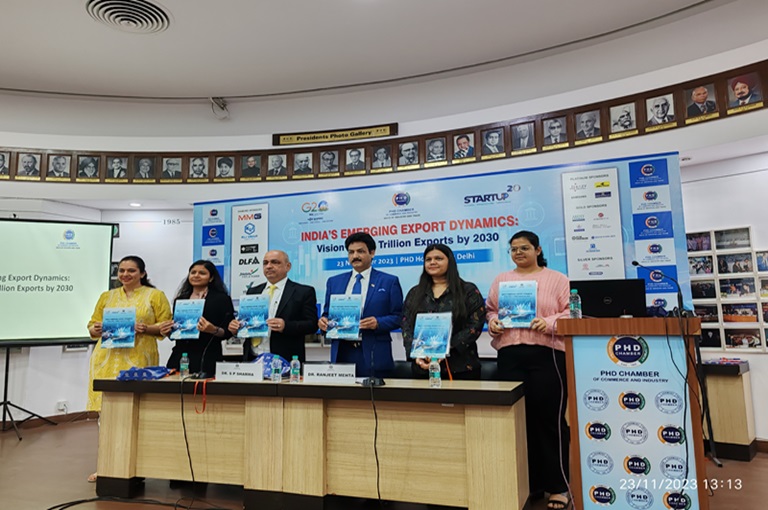PHD Chamber outlines strategy for achieving USD 2 trillion exports by 2030

New Delhi: India’s exports surged post-COVID, with growth rates of 20% in 2021 and 9.7% in 2022—the highest among the top 20 global exporters. A report by PHD Research Bureau, PHD Chamber of Commerce and Industry, envisions India reaching USD 2 trillion in exports by 2030.
Mr. Sanjeev Agrawal, President, PHD Chamber of Commerce and Industry said, “The dynamic policy environment provided by the government along with efforts of the exporters to connect with global value chains have enhanced the export volumes. After a strong rebound from the depths of the COVID-19 pandemic, the pace of exports was slowing during the past few months, however, exports of goods and services are showing signs of significant revival after a brief spell of slowdown as October 2023 exports picked up by 9%. During the past ten years, exports have accelerated significantly, rising from USD 375 billion in FY 2011 to USD 770 billion in FY 2023. Going forward, ease of doing exports with calibrated reforms by the government will be crucial to achieve the target of USD 2 trillion by 2030. We need to focus on reducing the cost of business and increase the ease of doing business to enhance the competitiveness of the domestic manufacturing. The Government should focus on reducing the cost of doing business including- Costs of capital, Cost of Power/ energy, Cost of Land and Availability of Land, Cost of Logistics, Cost of Labor. There is significant potential to increase exports by exploring new Free Trade Agreements (FTAs) with the EU and the UK. There exist significant complementarities between, India-EU and India-UK. New FTA will increase India’s participation in the globa! value chains.”
Top 10 export destinations have consistently grown over the last five years (FY 2019 to FY 2023 average): Togo (73%), the Netherlands (36%), Brazil (28%), Israel (27%), Indonesia (24%), Turkey (22%), Australia (20%), South Africa (19%), Saudi Arabia (16%), and Belgium (13%), according to the report.
Top 10 growing export commodities over the last five years (FY 2019 to FY 2023 average) include Sugar and confectionery (43%), Mineral fuel and oils (36%), Electrical machinery and parts (27%), Aluminum and articles (18%), Inorganic chemicals, precious and rare-earth metals (16%), Miscellaneous chemical products (16%), Cereals (14%), Iron and steel (12%), Ships, boats, and floating structures (11%), Rubber and articles (11%), and Optical, photographic, medical apparatus (10%), as per the research report.
Dr. SP Sharma, Chief Economist, PHD Chamber of Commerce and Industry said, “The industry body had identified 75 products on the basis of six-digit Harmonised system (HS code), these 75 commodities accounts for about 50 percent of India’s total exports for the FY 2023, suggesting that these commodities have a great potential to propel India’s exports. Nonetheless, India can scale up exports of these commodities exploring the massive untapped potential in the global markets, since they make up only 6% of global exports. These 75 products exports are USD 222 billion in the world exports of USD 3838 billion. These 75 products grew at 11% in 2022-23 as compared with 6% growth of India’s total merchandise exports in 2022-23. The growth of services during the last two years at 24% (average) is commendable as our services have shown a great resilience and price competitiveness in the globa! markets. The growth of services exports will also be a major growth driver to achieve the ambitious targets of USD 2 trillion exports by 2030.”
Dr. Ranjeet Mehta, Executive Director, PHD Chamber of Commerce and Industry said, “The launch of India’s new Foreign Trade Policy (FTP) 2023 with its five key elements of Duration, Dynamism, Decentralisation, Direction and Disaster proofing, is aimed at creating an enabling ecosystem for exporters. It shall bolster India’s export quantum while considering the size of the Indian economy and its manufacturing and service sector base. The FTP 2023 aims to increase India’s competitiveness in the global markets by promoting and developing each state to be able to integrate with the global trade which is a move in line with India’s vision of becoming Atmanirbhar.”







